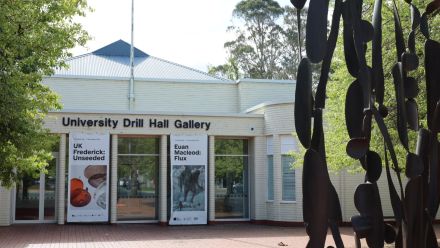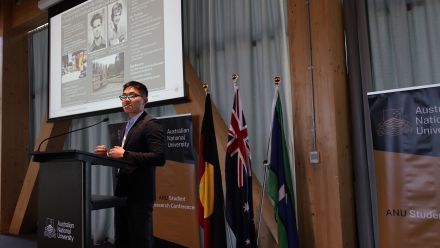Alicia Lillington (BIntR ‘13)
Gender equality is everyone's business. We need to acknowledge that we still have a long way to go and continue to educate ourselves on what true equality actually looks like
Article written by Dr Alex Schumann-Gillett (PhD '19), from the ºÚÁÏ̀́̀ĂWomen's Alumni Network.
Changing the world one conversation at a time, Alicia Lillington works to empower people to embrace change where culture meets technology.
Her current role is Change and Communications Lead for the Service Delivery Office at the Department of Finance.
Alicia chose to study at ºÚÁÏ̀́̀Ăbecause she wanted to go to a university that was at the forefront of thought leadership. While at ANU, she enjoyed the diversity of studying history, politics, Italian, drama and creative writing, while also having a great balance of theory based study and creativity. Her fondest memories of the ºÚÁÏ̀́̀Ăwere studying drama; she says, "It was so much fun to study a range of plays and be part of performances between politics lectures. It was the creative side to my degree. I also had the pleasure of studying the Vice Chancellor's Creating Knowledge course, which challenged my peers, along with myself to look at knowledge through a range of different lenses. In addition to this, I am grateful that I studied Italian. There are so many practical ways that Italian helps me in my work - particularly an understanding of Latin based language."
Alicia started her professional career as a Communications Manager at The Commonwealth Club in 2014, and has since continued her love of diversity by working on a range of high profile projects for the Department of Finance, Department of the Prime Minister and Cabinet, Department of Foreign Affairs and Trade, the Department of Human Services, the Australian Bureau of Statistics and IP Australia. Alicia likes to note that, "I started working when I was 14 at Baker's Delight. I think foundational jobs can really set you up for success. I always go back to the skills I learnt in customer service and the mentality that 'when there's nothing to do, sweep the floor' ".
Reflecting on her journey from university to Change and Communications Lead, Alicia notes that, "I never even knew the role of Change Manager existed, and I didn't intend to work in the field of communications. I studied international relations at university and thought that I would work in diplomacy. However, being open to opportunities and discovering new pathways has been an incomparable experience".
"Working in the technology space, I have seen the people side of tech, and communications in this space become more and more valued. It's exciting to see more women sharing their stories and getting involved in technology. I enjoy busting the myth that a lot of people seem to hold that they are 'not a tech person.' With an ever evolving digital landscape, I think we have to study, understand and keep learning about technology. It is particularly important that people create technology through a lens of diversity".
Alicia stays centred to her community in a number of ways, for example through tutoring, where for over 12 years she has given back, driven by the belief that future generations need excellent teachers to listen to them and inspire them to follow their dreams. Here, Alicia also draws on her plethora of skills from past roles, including in modelling, acting and public speaking. Alicia also volunteers her time in mentoring programs, such as the ºÚÁÏ̀́̀ĂCollege of Business and Economics' Momentum Program and is a guest speaker for Women in Technology events, for example Code Like a Girl. She believes "you can't be what you can't see". More broadly, she speaks at events about Communications, People and Innovation in the Public Sector.
Throughout Alicia's career, she has worked to leverage her professional positions to live her passion for empowering others and mentoring. As a Communications Adviser for the Information Management and Technology Division (IMD) at DFAT, she successfully led the inaugural Junior Coding Workshops in partnership with Code Like A Girl. The purpose of the event was to promote girls and women in technology, network with colleagues across the department and highlight the importance of the work of IMD. She created a project plan for the event and key communication material, including a brief for the Secretary. She also made linkages between key stakeholders. As a result of her strategic communications, the 100 places they had available for children of DFAT families sold out in one day. At the conclusion of the event, participants were surveyed and the responses were overwhelmingly positive. The Chief Information Officer, Secretary, and Deputy Secretary commended the event and endorsed future coding events as a result.
Reflecting on her time at ºÚÁÏ̀́̀Ăand how it has impacted her career journey, Alicia says that the most useful skills she learned have been, "Being a lifelong learner and challenging the status quo, as well as the ability to impart knowledge on to others. I have been a tutor for over 12 years, tutoring over 100 students in the Canberra and surrounding region. If there's one thing I've learnt from my extensive experience, it's the power of being a down to earth, relatable mentor for young people. My students have gone on to do amazing things - from architecture to running restaurants. I am an advocate for empowering young people to overcome barriers and have confidence in themselves".
Being a woman in technology, Alicia notes that, "Gender equality is everyone's business. We need to acknowledge that we still have a long way to go and continue to educate ourselves on what true equality actually looks like. I am disheartened sometimes as it feels like gender equality is simply a tick box and some people think it has already been achieved. But there is still a lot of work to do in this space. Men, women and non-binary people all have a role to play in reaching gender equality. We need to call out behaviours and actions that do not promote equality. If I'm honest, I still face gender and age based discrimination regularly. It's not okay".
For anyone starting out in their field, Alicia shares the following advice:
- "Get involved in technology! Girls, we need you!
- Don't hesitate to do the things you love. Try new things, you never know where they might lead.
- It's important to share your story, you never know who you might help by speaking up.
- Don't be afraid to pivot. My career has included customer service, acting, modelling, international relations, communications, technology and change management.
- I'm recognised for my ability to network and introduce people to one another, and to opportunities, but the word 'networking' scares me.
- Diversity is so important!! Being different is an asset. If you cannot see anyone like you in your chosen field, that is where you can create the space for something new.
- As you learn and grow, ask for, and document feedback from stakeholders. If it's something to work on, develop this area, if it's praise, keep it in a safe spot. This could be a journal or a Word document. No one has to know about it. When you're having a bad day, go back and read this feedback.
- Failures - behind my success, there are a lot of #fails! The difference is I have turned them into professional development opportunities. This is where a lot of people get stuck! But if you can overcome challenges, you will get ahead."
In the next 5-10 years, Alicia hopes to continue to inspire people to achieve their dreams, and share her message of overcoming impostor syndrome and perceived barriers. She adds, "many people have suggested I would make a great Prime Minister one day, so let's see!"


